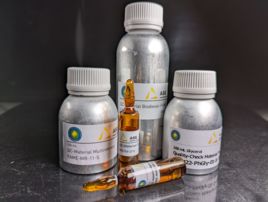AGQM No-Harm Test 2021/2022 – Register now!
The Association Quality Management Biodiesel (AGQM) tests oxidation stabilizers and flow improvers for biodiesel for their safe use. Registration for the next No-Harm Evaluation is possible until December 14th, 2021.
For some time now, various media have been pointing out that diesel fuel with a biodiesel content (fatty acid methyl ester, FAME) can be used for a maximum of 6 months, as the FAME content would degrade after this time. In addition, it would not be possible to use FAME in winter, as the cold stability cannot be guaranteed. That this does not correspond to the facts quickly becomes clear if one looks at the relevant sources or informs oneself on the AGQM homepage, which has compiled the technical issues related to the use of FAME as information material publicly available to all.
To slow aging and effectively prevent it for years to come, antioxidants have been used since the beginning of biodiesel use in the last century. Their use has proven effective to this day and means that even heating oil with 10% FAME content or even pure biodiesel (B100) can be stored stably for years if the user maintains proper housekeeping and non-ferrous metals are avoided. In some demanding temperature ranges, flow improvers for biodiesel (BDFI - biodiesel flow improver) are also used to ensure cold-operability. Antioxidants and flow improvers are not an invention for biodiesel but are necessarily also used in fossil fuels.
When using additives in all fuels, special care must be taken to exclude negative interactions with the fuel and its additives. AGQM has therefore developed three no-harm tests in cooperation with the mineral oil industry to check oxidation stabilizers and flow improvers to ensure that biodiesel additives are as safe as possible. These no-harm tests are now available for use again.
The no-harm test antioxidants for biodiesel as a diesel fuel component provides for testing of minimum requirements (B100), interaction tests (B100), engine oil compatibility, filtration properties, and an engine test in B10 fuel.
Antioxidants for biodiesel as a heating oil component will be examined in the second no-harm test in a B20 fuel. The minimum requirements are extended, and the interaction test is tightened; at the same time, the test for engine oil compatibility and the engine test are not required in the heating oil sector.
In the third no-harm test, flow improvers for biodiesel are subjected to a similar program as the antioxidants, with additional testing of emulsion, foam and corrosion properties.
You can register for testing your additive by 14.12.2021 at vasb@ntdz-ovbqvrfry.qr. Visit the AGQM website for the no-harm lists of all successful tested additives and more information on each no-harm test.





